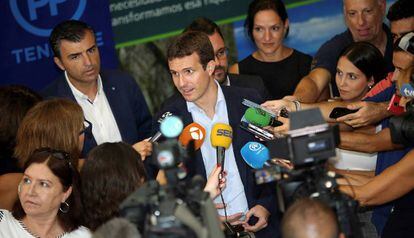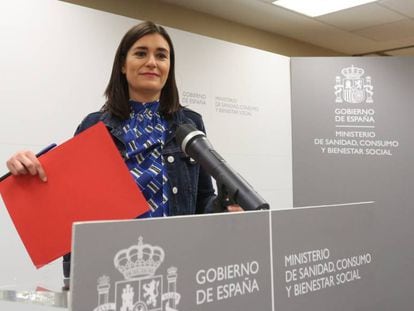Popular Party chief won’t face probe over master’s degree irregularities
Supreme Court has found no evidence Pablo Casado committed offenses, although it does point to proof of him receiving “favorable treatment,” which is not a crime

The president of the conservative Popular Party (PP), Pablo Casado, will not be investigated by the Supreme Court for alleged offenses related to a master’s degree that he received from Madrid’s King Juan Carlos University (URJC), a public education center. Casado is one of a number of Spanish politicians whose academic record has been under scrutiny after a series of irregularities emerged.
In its ruling, the Supreme Court found that there is no proof that Casado had committed any offenses, but did say that he may have received “favorable treatment,” pointing out that this is not a crime.
Casado’s case was taken to the Supreme Court given that he enjoys protection from prosecution in the lower courts
Casado’s case was taken to the Supreme Court given that, as a deputy in Congress, he is an “aforado,” meaning he enjoys protection from prosecution in the lower courts. The Madrid High Court had found that Casado could have committed two offenses: cohecho impropio, accepting a gift that is offered because of one’s public position, and cooperating in a prevaricación administrativa, or abetting unlawful decisions by public officers.
The key point of the case for the Supreme Court is that there is no proof that there was any preliminary agreement between Casado and the director of the master’s program that the politician – who was at the time the leader of the Madrid youth wing of the PP, New Generations, and a deputy in the Madrid regional government – was going to receive the academic qualification without having to meet even the minimum requirements that the rest of the students were subject to.
Casado received the postgraduate degree in regional law from the Public Law Institute (IDP) at the URJC in 2009. Earlier this year, he was forced to admit that he did not go to class, take exams or defend a dissertation before a panel, as other students were made to do. The university automatically waived 18 of his 22 classes – more than 80% of the coursework – on the basis that he already had a degree in law from Madrid’s Complutense University. He has thus far refused requests to make his final thesis public.
Casado has always argued that he followed the instructions and requirements that were given to him by the university
Casado has always argued that he followed the instructions and requirements that were given to him by the university.
The case came to light after a similar scandal that forced Cristina Cifuentes, also of the PP, to resign as regional premier of Madrid when it emerged that she had obtained the same degree without going to class or taking exams. She was unable to produce her end-of-course thesis. The final nail in the coffin of her political career was the leaking to the press of a video in which she was challenged by a security guard in a supermarket for stealing pots of face cream.
The academic scandal claimed another politician this month, when the health minister, Carmen Montón, was forced to quit, after mounting irregularities emerged regarding a master’s degree she had studied for, also at the URJC. Montón, of the Socialist Party (PSOE), claimed that she had done nothing wrong, but had to step down when it emerged that her final thesis contained sections that had been plagiarized.
Even the Spanish prime minister, Pedro Sánchez, has been caught up in an academic scandal after allegations surfaced that he had plagiarized parts of his doctoral thesis. Sánchez denied any wrongdoing, but was forced to admit that sections of a book he co-wrote based on the thesis did contain texts from other authors that had not been properly referenced.
English version by Simon Hunter.












































